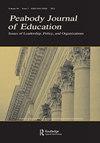现在谁应该控制教育?重新审视教育决策中的局部控制偏好
Q2 Social Sciences
引用次数: 0
摘要
摘要尽管地方控制学校的历史由来已久,但随着各州和联邦政府以及党派之间的斗争,教育问题在更高层次的政府中变得越来越有争议。鉴于这一变化,以及最近围绕学校应对COVID-19和学校在打击系统性种族主义中的作用的斗争,我们探讨了教育政治的转变如何影响公众对教育中地方主义的态度。我们证明,公众对地方控制的偏好并不像传统智慧所暗示的那样根深蒂固。当被问及在三级政府中教育资金或决策权的最佳分配时,地方政府从来都不是公众的首选。我们的研究结果还表明,对地方控制的偏好保持相对稳定,党派差异只略微增加;然而,党派分歧的扩大在父母之间更为明显。我们注意到,在过去几年里,民主党人已经调整了他们的偏好,在共和党人控制总统和国会时,他们略微转向支持地方决策。最后,我们观察到一些证据表明,促使个人考虑学校对COVID-19大流行的反应,导致他们倾向于地方控制教育。披露声明作者未报告潜在的利益冲突。注1:“父母”自然包括非父母的照顾者以及对家中未成年人承担很少照顾责任的成年人,而“非父母”包括在家庭以外对儿童的抚养发挥重要作用的个人请注意,在这个时代,关于党派控制的变化有限,限制了我们对可能配置的一个子集的检查。本文作者是哥伦比亚大学师范学院政治与教育专业的博士候选人。他研究学校与民主之间的关系,既关注教育如何塑造政治参与,又关注政治参与随后如何塑造学校。David M. Houston是乔治梅森大学的教育学助理教授。他研究教育政治、治理和公众舆论。本文章由计算机程序翻译,如有差异,请以英文原文为准。
Who Should Control Education Now? Revisiting Preferences for Local Control in Educational Decision Making
ABSTRACTDespite a long history of local control of schools, educational issues have become increasingly contested at higher levels of government as battles are fought in state and federal venues and along partisan lines. In light of this change as well as recent battles over school responses to COVID-19 and schools’ roles in combating systemic racism, we explore how the shifting politics of education have affected public attitudes toward localism in education. We demonstrate that the public’s preference for local control is not as deeply held as conventional wisdom suggests. Local government is never the public’s most preferred option when asked about the optimal distribution of education funding or decision-making authority across all three levels of government. Our results also show that preferences for local control have remained relatively stable and exhibit only narrowly increasing partisan differences; however, the increase in the partisan divide is larger among parents. We note that Democrats have adjusted their preferences over the last few years, shifting modestly in favor of local decision-making when Republicans control the Presidency and Congress. Finally, we observe some evidence that prompting individuals to consider schools’ responses to the COVID-19 pandemic causes them to gravitate toward local control of education. Disclosure statementNo potential conflict of interest was reported by the authors.Notes1 “Parents” naturally includes non-parental caregivers as well as adults who assume few childcare responsibilities for the minors in their household, while “non-parents” include individuals who play a large role in the upbringing of children outside their home.2 Note that there is limited variation with respect to partisan control during this era, restricting our examination to a subset of possible configurations.Additional informationNotes on contributorsCameron J. ArnzenCameron J. Arnzen is a Ph.D. candidate in the Politics & Education program at Teachers College, Columbia University. He studies the relationship between schools and democracy, concentrating both on how education shapes political participation as well as how political participation subsequently shapes schools.David M. HoustonDavid M. Houston is an Assistant Professor of Education at George Mason University. He studies education politics, governance, and public opinion.
求助全文
通过发布文献求助,成功后即可免费获取论文全文。
去求助
来源期刊

Peabody Journal of Education
Social Sciences-Education
CiteScore
2.20
自引率
0.00%
发文量
43
期刊介绍:
Peabody Journal of Education (PJE) publishes quarterly symposia in the broad area of education, including but not limited to topics related to formal institutions serving students in early childhood, pre-school, primary, elementary, intermediate, secondary, post-secondary, and tertiary education. The scope of the journal includes special kinds of educational institutions, such as those providing vocational training or the schooling for students with disabilities. PJE also welcomes manuscript submissions that concentrate on informal education dynamics, those outside the immediate framework of institutions, and education matters that are important to nations outside the United States.
 求助内容:
求助内容: 应助结果提醒方式:
应助结果提醒方式:


